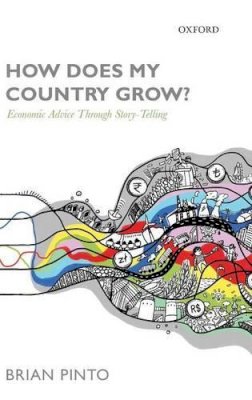
Stock image for illustration purposes only - book cover, edition or condition may vary.
How Does My Country Grow?: Economic Advice Through Story-Telling
Brian Pinto
€ 79.64
FREE Delivery in Ireland
Description for How Does My Country Grow?: Economic Advice Through Story-Telling
Hardcover. This book shows how to think about economic growth and sovereign debt in live country situations. The country stories are practical applications of real-time analysis involving significant economic events of the past two decades (e.g. Poland's early transition, India's unexpected growth takeoff in 2003, and the Russian crisis of 1998). Num Pages: 272 pages, 10 Figures, 14 Tables, 27 Boxes. BIC Classification: KCB; KCG; KCM; KCP. Category: (P) Professional & Vocational; (U) Tertiary Education (US: College). Dimension: 242 x 157 x 19. Weight in Grams: 540.
Written by a former World Bank economist, How Does My Country Grow? distils growth policy lessons from the author's first-hand experience in Poland, Kenya, India, and Russia, and his contributions to the economic policy debates that followed the emerging market crises of 1997 to 2001, extending up to the global financial crisis of 2008-09. Based on living and working in the field, the author argues that country economic analysis is in effect a separate, integrative branch of economics that draws upon but is distinct from academic economics. The country stories recounted, reinforced by the emerging market experience since the ... Read more
Written by a former World Bank economist, How Does My Country Grow? distils growth policy lessons from the author's first-hand experience in Poland, Kenya, India, and Russia, and his contributions to the economic policy debates that followed the emerging market crises of 1997 to 2001, extending up to the global financial crisis of 2008-09. Based on living and working in the field, the author argues that country economic analysis is in effect a separate, integrative branch of economics that draws upon but is distinct from academic economics. The country stories recounted, reinforced by the emerging market experience since the ... Read more
Product Details
Publisher
Oxford University Press
Format
Hardback
Publication date
2014
Condition
New
Weight
540g
Number of Pages
270
Place of Publication
Oxford, United Kingdom
ISBN
9780198714675
SKU
V9780198714675
Shipping Time
Usually ships in 15 to 20 working days
Ref
99-7
About Brian Pinto
Brian Pinto is Chief Economist, Emerging Markets, at GLG Partners LP. Previously, he worked at the World Bank for almost 30 years, where his focus was predominantly on transition economics, sovereign debt, and economic growth. He lived in Poland at the start of its momentous reforms (1990-92) as well as in Russia, witnessing first-hand its 1998 crisis and subsequent recovery ... Read more
Reviews for How Does My Country Grow?: Economic Advice Through Story-Telling
In spite of its playful title and easy-on-readers subtitle, economist Pintos brief book is a sophisticated, engaging odyssey on economic growth and development. Laden with equations, figures, tables, boxes, annexes (appendixes), notes, and 20 pages of references and index, the book is an authoritative complement to more abstract, theoretical treatments of economic growth.
A. R. Sanderson, University of Chicago, ... Read more
A. R. Sanderson, University of Chicago, ... Read more
